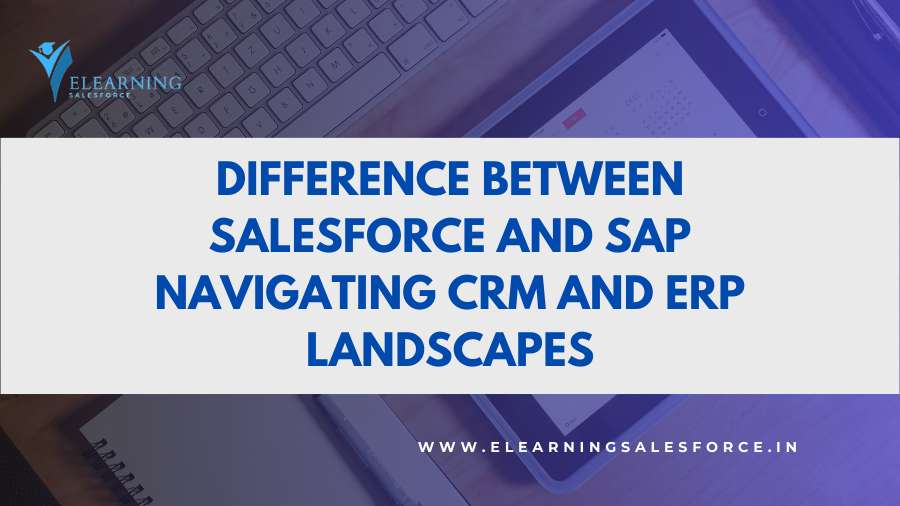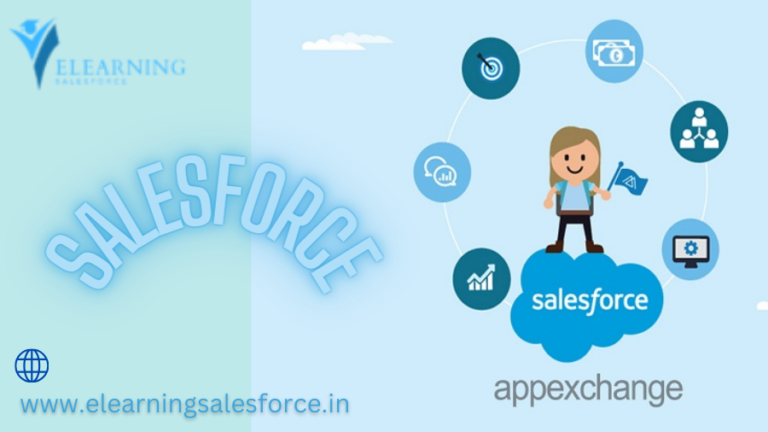Difference between Salesforce and SAP: In the ever-evolving landscape of business technology, the choice between Salesforce and SAP is pivotal. While Salesforce excels in Customer Relationship Management (CRM), SAP is renowned for its expertise in Enterprise Resource Planning (ERP). Let’s delve into the distinctions between these two giants and navigate the realms of CRM and ERP.
Understanding Salesforce
Features and Focus on CRM
Salesforce is a powerhouse in the world of CRM, offering a suite of features dedicated to enhancing customer relationships. From lead management to marketing automation, Salesforce caters to businesses of all sizes, emphasizing the importance of customer-centric strategies.
Target Audience and Use Cases
Salesforce is often the preferred choice for businesses looking to streamline their sales and marketing processes. Its robust CRM functionalities make it ideal for organizations aiming to build and maintain strong customer relationships.
Unveiling SAP
Features and Emphasis on ERP
SAP, on the other hand, is synonymous with ERP solutions. Its features span finance, human resources, supply chain management, and more. SAP aims to provide a holistic approach to business operations, integrating various facets into a unified system.
Ideal Users and Scenarios
SAP is commonly chosen by large enterprises with complex operational structures. Its ERP solutions are designed for organizations seeking comprehensive tools to manage and optimize diverse business functions.
Head-to-Head Comparison
CRM vs. ERP: Core Functionalities
- Salesforce (CRM):
- Focuses on sales, marketing, and customer service.
- Enhances customer interactions and streamlines communication.
- SAP (ERP):
- Integrates various business functions like finance, HR, and supply chain.
- Aims for a unified approach to optimize overall business operations.
Scalability and Customization Options
- Salesforce:
- Highly scalable, catering to businesses of all sizes.
- Extensive customization options to tailor CRM solutions.
- SAP:
- Designed for scalability to accommodate the needs of large enterprises.
- Customizable ERP modules to align with specific organizational requirements.
Integration Capabilities
- Salesforce:
- Offers seamless integrations with various third-party applications.
- Embraces a connected ecosystem for enhanced functionalities.
- SAP:
- Integrates different modules within its ERP system for comprehensive data sharing.
- May have a steeper learning curve for third-party integrations.
User Interface and Ease of Use
- Salesforce:
- User-friendly interface with a focus on accessibility.
- Quick onboarding for users with varying technical expertise.
- SAP:
- Comprehensive interface catering to various business functions.
- May require training for users unfamiliar with ERP systems.
Tailoring Solutions to Business Needs
Assessing Specific Business Requirements
To make an informed choice between Salesforce and SAP, businesses should assess their specific needs. If customer relationship management is the primary focus, Salesforce may be the right fit. For organizations requiring a holistic approach to business operations, SAP’s ERP solutions offer a comprehensive solution.
Real-world Use Cases
Explore examples of businesses successfully implementing Salesforce for CRM excellence and SAP for streamlined ERP operations. Real-world use cases provide insights into how each platform addresses unique business challenges.
Pros and Cons of Each Platform
Salesforce (CRM)
Pros:
- User-friendly with quick onboarding.
- Highly customizable for diverse CRM needs.
- Well-suited for businesses of all sizes.
Cons:
- May require additional integrations for comprehensive business solutions.
SAP (ERP)
Pros:
- Comprehensive ERP functionalities covering diverse business areas.
- Ideal for large enterprises with complex operational structures.
Cons:
- Steeper learning curve, especially for users new to ERP systems.
- May have higher upfront costs for implementation.
Tips for Effective Implementation
Best Practices for Implementing Salesforce and SAP
- Define Clear Objectives: Clearly outline your objectives to ensure the selected platform aligns with organizational goals.
- Invest in Training: Provide comprehensive training to users, especially for SAP’s ERP system, to maximize its benefits.
Frequently Asked Questions (FAQs)
- Can Salesforce be used for comprehensive business operations like SAP?
- Salesforce is primarily a CRM platform, while SAP focuses on ERP for holistic business operations.
- Is SAP suitable for small businesses?
- SAP’s ERP solutions are more tailored for large enterprises with complex operational structures.
- Which platform is more cost-effective for a growing business?
- Salesforce may be more cost-effective for growing businesses focusing on CRM. SAP’s comprehensive solutions may have higher upfront costs.
- Does Salesforce offer ERP functionalities?
- Salesforce is primarily a CRM platform, but it does offer some additional business solutions. For comprehensive ERP, SAP is a more suitable choice.
- What training resources are available for users new to Salesforce and SAP?
- Both Salesforce and SAP provide training resources for users at different levels of expertise.
Conclusion
In the Salesforce vs. SAP debate, the choice depends on the nature and goals of your business. If streamlining customer relationships is your priority, Salesforce’s CRM solutions shine. For large enterprises seeking an all-encompassing ERP system, SAP provides the tools for comprehensive business optimization.



